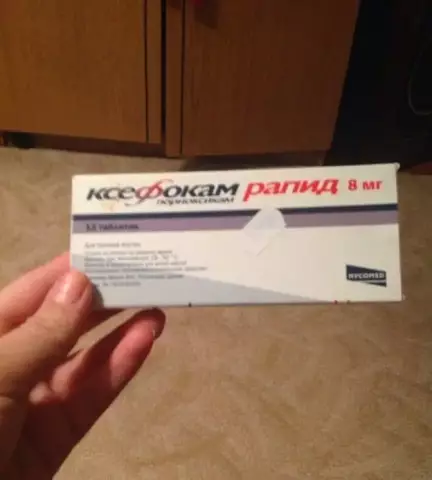- Author Rachel Wainwright wainwright@abchealthonline.com.
- Public 2023-12-15 07:39.
- Last modified 2025-11-02 20:14.
Pentanov-N
Pentanov-N: instructions for use and reviews
- 1. Release form and composition
- 2. Pharmacological properties
- 3. Indications for use
- 4. Contraindications
- 5. Method of application and dosage
- 6. Side effects
- 7. Overdose
- 8. Special instructions
- 9. Application during pregnancy and lactation
- 10. Use in childhood
- 11. In case of impaired renal function
- 12. For violations of liver function
- 13. Use in the elderly
- 14. Drug interactions
- 15. Analogs
- 16. Terms and conditions of storage
- 17. Terms of dispensing from pharmacies
- 18. Reviews
- 19. Price in pharmacies
Latin name: Pentanov-N
ATX code: N02BB72
Active ingredient: Codeine + Caffeine + Metamizole sodium + Naproxen + Phenobarbital (Codeinum + Caffeine + Metamizole natrium + Naproxen + Phenobarbital)
Producer: JSC "Pharmstandard-Leksredstva" (Russia)
Description and photo update: 2019-13-11
Prices in pharmacies: from 166 rubles.
Buy

Pentanov-N is a combined analgesic drug containing an analgesic opioid agent + non-steroidal anti-inflammatory drugs (NSAIDs) + a psychostimulant drug + barbiturate.
Release form and composition
Dosage form - tablets: flat-cylindrical, color from white with a creamy or yellowish tint to pure white; the abbreviated name of the drug "PENT-N" is stamped on one of the sides by embossing (in a cardboard box 1 or 2 cell contour packs containing 10 tablets each, and instructions for use of Pentanov-N).
Active ingredients in 1 tablet:
- phenobarbital - 10 mg;
- codeine or codeine phosphate in terms of codeine - 8 mg;
- caffeine - 50 mg;
- naproxen - 100 mg;
- metamizole sodium (analgin) - 300 mg.
Auxiliary components: magnesium stearate - 7 mg; sodium citrate - 4 mg; low molecular weight medical polyvinylpyrrolidone (low molecular weight povidone) - 9 mg; potato starch - 242 mg.
Pharmacological properties
Pharmacodynamics
Pentanov-N is a combined drug that has antipyretic, anti-inflammatory and analgesic effects.
Pharmacological actions of the drug, due to its active ingredients:
- metamizole sodium, naproxen: have anti-inflammatory and analgesic effects;
- codeine: by stimulating opiate receptors in various parts of the central nervous system, it activates the antinociceptive system and changes the emotional perception of pain;
- phenobarbital, codeine: increase the analgesic effect of naproxen and metamizole sodium;
- caffeine: increases physical and mental performance, promotes the expansion of blood vessels of the kidneys, skeletal muscles, heart and brain, eliminates drowsiness and fatigue, increases the permeability of histohematological barriers and the bioavailability of non-narcotic analgesics, thereby enhancing the therapeutic effect of Pentanov-N.
Pharmacokinetics
All active substances that make up Pentanova-N, when taken orally, are well absorbed in the gastrointestinal tract.
Pharmacokinetic characteristics of the active components of Pentanov-N:
- metamizole sodium: it is hydrolyzed in the intestinal wall, thus forming its active metabolite - 4-methyl-amino-antipyrine, which in turn is metabolized into 4-formyl-amino-antipyrine and other metabolites. The level of binding of 4-methyl-amino-antipyrine with blood proteins varies from 50 to 60%. Excretion of metabolites takes place through the kidneys, they are also excreted in breast milk;
- naproxen: bioavailability of the substance is 95%, binding to blood proteins at the level of 98-99%. The half-life is from 12 to 15 hours. It is excreted mainly in the form of a metabolite (dimethylnaproxen) in the urine, in small quantities in the bile;
- caffeine: absorbed in the intestines; the half-life is 5 hours, but sometimes it rises to 10 hours. Approximately 10% of the substance is excreted unchanged, the rest is excreted mainly as metabolites by the kidneys;
- codeine: it binds to blood proteins only slightly. In the liver, it undergoes biotransformation (through demethylation, 10% is converted into morphine). Unchanged from 5 to 15% of the dose is excreted through the kidneys;
- phenobarbital: its bioavailability is 80%. In blood plasma, it binds to proteins by 50%, penetrates well through the placenta. Biotransformation of the substance is carried out in the liver. Its main metabolite is pharmacologically inactive. It is excreted through the kidneys, including 20 to 25% unchanged.
Indications for use
- mild and moderate pain syndrome of various origins (with toothache, migraine, headache, neuralgia, menstrual pain, radiculitis, muscle and joint pain);
- feverish conditions, colds and other pathologies, accompanied by inflammation and pain.
Contraindications
Absolute:
- severe renal and / or hepatic impairment;
- hepatic porphyria;
- exacerbation of gastric ulcer and duodenal ulcer;
- bronchial asthma;
- bronchospasm;
- complete or incomplete combination of intolerance to acetylsalicylic acid or other NSAIDs with bronchial asthma and recurrent polyposis of the paranasal sinuses and nose;
- conditions accompanied by respiratory depression;
- deficiency of glucose-6-phosphate dehydrogenase;
- hemorrhagic diathesis;
- agranulocytosis;
- leukopenia;
- anemia;
- increased intracranial pressure;
- traumatic brain injury;
- acute myocardial infarction;
- arrhythmia;
- severe arterial hypertension;
- alcoholic intoxication;
- history of abuse of sedatives, tranquilizers and opioids;
- glaucoma;
- high activity of cytochrome P450 (CYP2D6) enzymes;
- pregnancy;
- period of breastfeeding;
- children under 12 years of age;
- individual intolerance to the components in the composition of Pentanov-N.
In children and adolescents aged 12-18 years, the absolute contraindications to the use of Pentanov-N are extensive surgical interventions, multiple injuries, severe heart pathologies, the period after the transferred tonsillectomy and / or adenoidectomy, respiratory dysfunction (including neuromuscular pathologies), and also respiratory diseases (bronchial asthma and other chronic diseases of the respiratory tract).
Relative (Pentanov-N is prescribed under medical supervision):
- impaired liver and kidney function;
- peptic ulcer of the stomach and duodenum in remission;
- arterial hypertension of mild to moderate severity;
- elderly age.
Pentanov-N, instructions for use: method and dosage
Pentanov-N tablets are taken orally.
Recommended dosage: 1 pc. from 1 to 3 times a day.
The maximum daily dose of the drug is 4 tablets.
Without a doctor's prescription, it is not recommended to take Pentanov-N for more than 3 days as an antipyretic and for more than 5 days as an anesthetic.
Side effects
During the period of application of Pentanov-N, the development of pain in the epigastric region, skin allergic reactions (urticaria, itching, rash), drowsiness, palpitations, dizziness, dyspeptic disorders in the form of constipation, nausea and vomiting is possible.
In rare cases, the use of the drug leads to inhibition of hematopoiesis (agranulocytosis, granulocytopenia, leukopenia).
Long-term drug therapy in high doses can impair the function of the kidneys and liver.
Overdose
The main symptoms of an overdose of Pentanova-N: drowsiness, delirium, weakness, respiratory depression, vomiting, nausea, stomach pain, cardiac arrhythmias, tachycardia.
In case of intoxication, it is recommended to induce vomiting, perform gastric lavage through a tube, use activated carbon or other adsorbents. If necessary, carry out symptomatic treatment aimed at maintaining vital functions.
special instructions
In patients taking Pentanov-N for more than 5 days, it is important to monitor the functional state of the liver and the picture of peripheral blood.
It should be taken into account that the composition of the drug contains phenobarbital and codeine, which can contribute to obtaining false-positive results when conducting test systems, including doping control.
The use of the drug complicates the diagnosis in patients with acute abdominal pain syndrome.
Against the background of atopic bronchial asthma and pollinosis, there is an increased likelihood of developing hypersensitivity reactions.
Influence on the ability to drive vehicles and complex mechanisms
Due to the fact that taking Pentanov-N can lead to the development of a sedative effect, patients during the treatment period are not recommended to drive vehicles and engage in potentially hazardous activities, the implementation of which requires the speed of psychomotor reactions and increased attention.
Application during pregnancy and lactation
Pentanov-N is not prescribed during pregnancy.
If it is necessary to use the drug during lactation, stop breastfeeding.
Pediatric use
The drug is not prescribed for children under 12 years of age.
For pediatric patients from 12 to 18 years old, Pentanov-N is contraindicated to use for the relief of pain during extensive surgical interventions, multiple injuries, severe heart pathologies, during the period after surgical removal of the palatine tonsils and / or adenoids, in case of impaired respiratory function (including neuromuscular nature), as well as diseases of the respiratory system (bronchial asthma and other chronic pathologies of the respiratory tract).
With impaired renal function
- use is contraindicated: severe renal failure;
- application requires medical supervision: impaired renal function.
For violations of liver function
- use is contraindicated: severe hepatic impairment, hepatic porphyria;
- application requires medical supervision: liver dysfunction.
Use in the elderly
For elderly patients, the drug is prescribed with caution.
Drug interactions
Possible interactions of active substances in the composition of Pentanov-N with other drugs / substances that should be taken into account:
- other non-narcotic analgesics: mutual intensification of toxic effects is possible;
- allopurinol, oral contraceptives, tricyclic antidepressants: increase the toxicity of analgin (metamizole sodium);
- phenylbutazone, barbiturates and other inducers of microsomal liver enzymes: weaken the action of analgin (metamizole sodium);
- cyclosporine: analgin (metamizole sodium) lowers its level in the blood;
- tranquilizers, sedatives: the analgesic effect of the drug is enhanced.
Analogs
The analogue of Pentanov-N is Piralgin, Benalgin, Tetralgin, Trialgin, Santotitralgin, Pentabufen, etc.
Terms and conditions of storage
Store in a place protected from light and moisture at temperatures up to 25 ° C. Keep out of the reach of children.
The shelf life is 3 years.
Terms of dispensing from pharmacies
Available without a prescription.
Reviews about Pentanov-N
To date, there are practically no reviews about Pentanov-N on specialized sites and resources, since the drug received such a name relatively recently. But everyone knows its old name - Pentalgin-N. Many users characterize the drug as the best or one of the best spasmodic analgesics. It helps with any pain, quickly and effectively relieves pain syndrome, lowers temperature, relieves aching joints, relieves migraines. The drug is inexpensive, economical and affordable (with a prescription).
As disadvantages indicate the presence of codeine in the composition, which is addictive with prolonged use, as well as the need to have a prescription for the acquisition of Pentanova-N.
Price for Pentanov-N in pharmacies
The price of Pentanov-N is unknown, since the drug is not available in pharmacies. The approximate cost of an analogue of the drug - Piralgin (codeine + caffeine + sodium metamizole + naproxen + phenobarbital) for 10 tablets in a package is from 99 to 150 rubles.
Pentanov-N: prices in online pharmacies
|
Drug name Price Pharmacy |
|
Pentanov-N tablets 10 pcs. 166 r Buy |

Maria Kulkes Medical journalist About the author
Education: First Moscow State Medical University named after I. M. Sechenov, specialty "General Medicine".
Information about the drug is generalized, provided for informational purposes only and does not replace the official instructions. Self-medication is hazardous to health!






